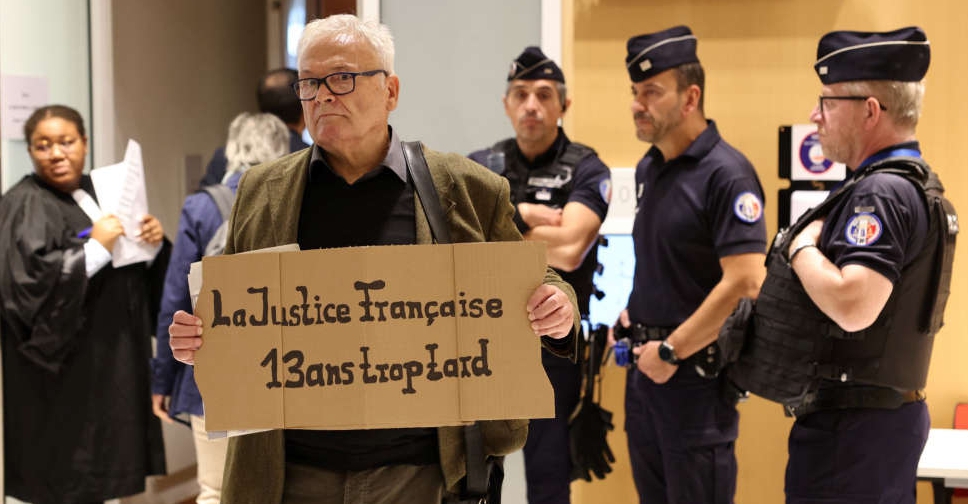
A French criminal court opened the historic manslaughter trial of Air France and planemaker Airbus on Monday, with angry relatives demanding justice more than 13 years after an A330 jetliner ploughed into the Atlantic, killing everyone on board.
The heads of both companies pleaded not guilty to "involuntary manslaughter" after officials read out names of the 228 people who died when flight AF447 plunged into the darkness during an equatorial storm en route from Rio de Janeiro to Paris on June 1, 2009.
Several relatives shouted protests including "shame" and "too little, too late" as Air France Chief Executive Anne Rigail and then Airbus SE CEO Guillaume Faury expressed condolences during opening statements in the nine-week trial.
"Thirteen years we have been waiting for this day and we have prepared for a long time," Daniele Lamy, who lost her son in the accident, told Reuters before the hearing.
After a two-year search for the A330's black boxes using remote submarines, investigators found pilots had responded clumsily to a problem involving iced-up speed sensors and lurched into a freefall without responding to "stall" alerts.
But France's BEA accident agency also revealed earlier discussions between Air France and Airbus about growing problems with external "pitot probes" that generate the speed readings.
Summarising prosecution findings, a Paris judge said Airbus was suspected of reacting too slowly to the rising number of speed incidents with the introduction of an updated probe.
Preliminary findings had meanwhile called into question the efforts taken by the airline to ensure pilots were well trained.
The relative roles of pilot or sensor error will be key to the trial, exposing bitter divisions that have raged behind the scenes between two of France's iconic firms for over a decade.
Airbus blames pilot error for the crash while the French carrier claims confusing alarms and data overwhelmed the pilots.
Lawyers warned against allowing the long-awaited trial - which is going ahead after a decision to abandon the case was overturned - to sideline relatives of the 33 nationalities represented on AF447, mainly French, Brazilians and Germans.
"It's a trial where the victims must remain at the centre of debate. We don't want Airbus or Air France to turn this trial into a conference of engineers," said lawyer Sebastien Busy.
It is the first time French companies have gone on trial for "involuntary manslaughter" following an air crash. Victims' families say individual managers should also be in the dock.
Relatives also brushed off the maximum fine of 225,000 euros ($220,612) each company could receive - equivalent to just two minutes of pre-COVID-19 revenue for Airbus or five minutes of passenger revenue for the airline.
Undisclosed larger sums have also been made in compensation or out-of-court settlements.
"It's not the 225,000 euros that will worry them. It's their reputations... that's what's at stake for (Air France and Airbus)," said families lawyer Alain Jakubowicz.
"For us it is about something else, the truth... and ensuring lessons are learned from all these great catastrophes. This trial is about restoring a human dimension," he told reporters.
AF447 sparked a rethink about training and technology and is seen as one of a handful of accidents that changed aviation, including industry-wide improvements in recovering lost control.
Centre-stage is the mystery of why the crew of three, with more than 20,000 hours of flying experience between them, failed to understand that their modern jet had lost lift or "stalled".
That required the basic manoeuvre of pushing the nose down instead of yanking it up as they did for much of the fatal four-minute plunge towards the Atlantic in a radar dead-zone.
France's BEA has said the crew responded incorrectly to the icing problem, but also did not have training needed to fly manually at high altitude after the autopilot dropped out.
It also highlighted inconsistent signals from a display called the flight director, which has since been redesigned to switch itself off in such events to avoid confusion.
"It will be a difficult trial and we are here to offer compassion... but also our contribution to truth and understanding," Airbus CEO Faury told reporters after the opening hearing.
Rigail expressed "the deepest compassion" after telling the court Air France would never forget its worst-ever accident.
 UK inquiry finds 'chilling' cover-up of infected blood scandal
UK inquiry finds 'chilling' cover-up of infected blood scandal
 Iranian President Raisi killed in helicopter accident, state media says
Iranian President Raisi killed in helicopter accident, state media says
 ICC prosecutor seeks arrest warrants for Israeli, Hamas leaders
ICC prosecutor seeks arrest warrants for Israeli, Hamas leaders
 Assange given permission to appeal against US extradition
Assange given permission to appeal against US extradition
 Israel intends to broaden Rafah sweep, Defence Minister tells US
Israel intends to broaden Rafah sweep, Defence Minister tells US




